Merchant of Venice Act 2, Scene 9 Modern English Translation Meaning Annotations – ICSE Class 10 & 9 English
EnglishMathsPhysicsChemistryBiology
ICSE SolutionsSelina ICSE SolutionsML Aggarwal Solutions
Original Text
Act II Scene IX
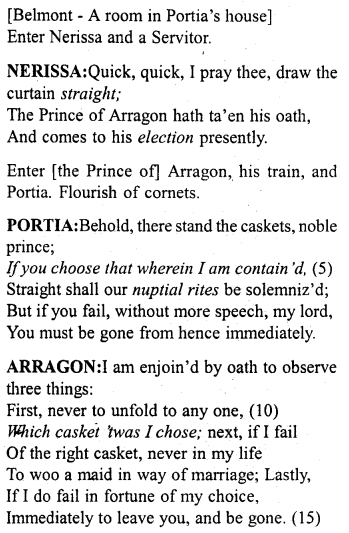
Modern English Reading
Act II Scene IX
NERISSA : Quickly, quickly, please, draw the curtain right away; the Prince of Aragon has taken his oath, and comes to make his choice now.
Enter [the Prince of] Arragon, his train, and Portia. Flourish of cornets.
PORTIA : Behold, the chests stand there, noble Prince: If you choose the one that I am contained in, Our marriage vows will be solemnized right away; But if you fail, my lord, you must be gone from here immediately without any more talking.
ARRAGON : I am required by oath to observe three things: First, never to tell anyone which chest I chose; next, if I fail to choose the right chest, I will never Court a maid to marry for my whole life; Lastly, if I do fail in choosing the right chest, I will leave you immediately and be gone.
Word Meaning With Annotation
Straight : at once, election : “selection”, i.e. his choice between the three caskets. If you choose that wherein I am contain’d : the one which contains my portrait, nuptial rites : marriage ceremonies, which casket ’twas I chose : which casket it was that I did’ choose.
Original Text
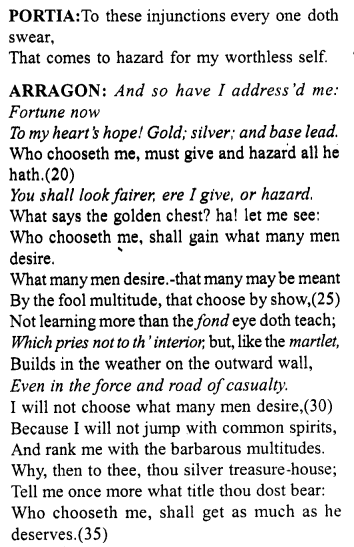
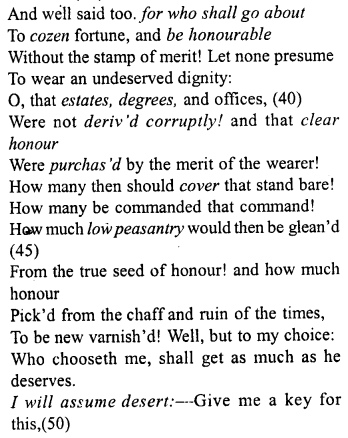

Modern English Reading
PORTIA : Everyone swears to these conditions who come to take a chance for my worthless self.
ARRAGON : And I have prepared myself like that. Fortune now Lead me to my heart’s hope! Gold, silver, and base lead.” Who chooses me must give and gamble all he has.” You shall look more beautiful before I give or gamble. What says the golden chest? Ha! Let me see:” Who chooses me shall gain what many men desire.” What many men desire! that “many” may mean the foolish multitudes, that choose by outward appearance, not learning any more than their loving eyes teach, which doesn’t go to the inside but, like the marten, builds on the outside wall in any weather, even in the force of wind and on the road to ruin. I will not choose what many men desire, because I will not jump with common spirits and rank myself with the barbarous multitudes. Why, then to you, you silver treasure-house; tell me once more what title you bear:” Who chooses me shall get as much as he deserves.” And it is said well too, because who shall go about to steal a fortune, and still be honorable without the stamp of deserving it? Let no one pretend to wear an undeserved dignity. Oh! that fortunes, degrees, and offices were not earned by corruption, and that clear honors were purchased by the merit of the wearer! How many then would be covered that stand naked; how many would be commanded that command; how much low peasantry would then be taken from from the true seed of honor; and how much honor picked from the garbage and ruin of the times to be newly painted! Well, to my choice:” Who chooses me shall get as much as he deserves.” I will assume I am deserving. Give me a key for this, and instantly unlock my fortunes here.
Word Meaning With Annotation
And so have I address’d me : and I have prepared myself accordingly. Fortune now to my heart’s hope : he addresses the Goddess of fortune. Gold; silver; and base lead : the use of the word “base” reveals that Arragon starts in the same mistaken attitude that Morocco showed. Arragon is immediately prejudiced against the leaden casket, because the metal of which it is made is not so showy and attractive as silver or gold. Evidently the intention of Portia’s father, when he arranged the trial of the caskets, was that the inscriptions alone should be the proper test. The different metals would only serve to mislead men who paid too much attention to outward show and appearance. You shall look fairer, ere I give, or hazard : he falls into the same error as Morocco, and does not realise that the hazard is to be made for Portia, not as he says for lead, fond : foolish, which pries not to th’ interior : which does not search for the inner meaning of anything, martlet: let martin, a species of swallow, which builds a nest of mud against the outer walls of houses, even in the force and road of casualty : “open to disaster, and in the very path of danger.” for who shall go about : who shall attempt, cozen : “to cheat”, be honourable : “attain to honours.” estates : “positions of dignity”, degree : “high mark”, derived corruptly : granted from unworthy motives; sold, clear honour : unstained or innocent honour.purchased : obtained. There is no reference to buying in the usual sense, cover : keep their hats on. low peasantry : “base fellows”. This shows the habit which had crept in, during the middle ages, of thinking of two great classes, the upper classes or nobility who were men of honour, and the lower classes who were base cultivators of the soil. I will assume desert : I shall be content with what I deserve.
Original Text
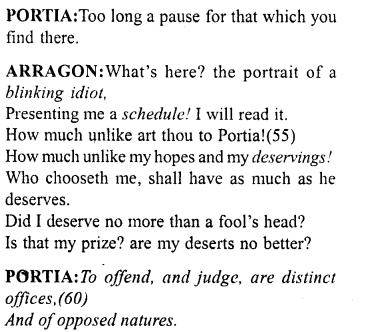
Modern English Reading
PORTIA : That’s too long a pause over what you find there.
ARRAGON : What’s here? The portrait of a blinking idiot, Presenting me a piece of paper! I will read it. This doesn’t look very much like Portia! This doesn’t look very much like what I deserve!” Who chooses me shall get as much as he deserves.” Did I deserve no more than a fool’s head? Is that my prize? Is my deserving no better than that?
PORTIA : To insult and judge are different things, And of opposite natures.
Word Meaning With Annotation
Blinking idiot : stupid-eyed fool, schedule : the same as “scroll”, deservings : merits: deserves: to offend, and judge, are distinct offices, and of opposed natures : “Arragon may be regarded as having been on his trial, and a prisoner is not supposed to criticise the verdict”. Still it may be better to explain “You have been sentenced but not insulted; there is nothing personal in the decision!” distinct offices : separate things
Original Text
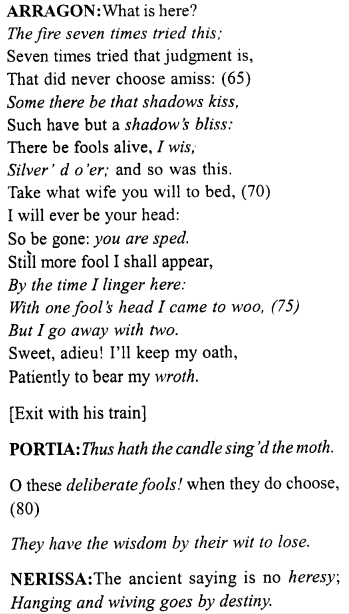
Modern English Reading
ARRAGON : What is this here?” The fire tried this seven times. The judgment that never chose wrong is tried seven times. There are some men that shadows kiss; Men like this have only a shadow’s bliss; there are fools alive, I know, that are silvered over, and so was this chest. Take whatever wife you want to bed, I will be your head forever: So be gone; you are finished.” I shall appear to be more foolish by the time I stay here; I came to court with one fool’s head, But I go away with two. Sweetheart, goodbye! I’ll keep my oath, Patiently to deal with my anger.
[Exit with his train]
PORTIA : In this way, the candle has burned the moth. Oh, these deliberate fools! When they choose, they have the wisdom to lose by their senses.
NERISSA : The ancient saying is no lie:” Hanging and getting a wife are up to Fate.”
Word Meaning With Annotation
The fire seven times tried this : “this” refers to the silver. The line refers to the words from the Bible, some there be that shadows kiss : “shadow” is here used generally as being the reverse of “substance” i.e., some people neglect the sound and substantial things of life to pursue empty shows, shadow’s bliss : “unreal happiness.” I wis : Certainly, silvered o’er : “whose folly is concealed by their silvery hairs.” you are sped : your business is completed, by the time I linger here : the longer I remain here, with one fool’s head I came to woo, But I go away with two : I came here a fool, and I depart a double fool, wroth : misfortune. Not the usual sense of “anger”, thus hath the candle sing’d the moth : Arragon is here compared to a foolish insect that has fluttered around a bright light, and has been burnt, deliberate fools : deliberating fools, in the sense that they calculated too much. The right choice depended not on skilful reasoning, but on love, which should have been prepared to “hazard all he hath”, they have the wisdom by their wit to lose : “They have enough sense, at any rate, to allow their small minds to lead than astray”, heresy : falsehood, hanging and wiving goes by destiny : “Wedding is destiny, and hanging like wise”
Original Text
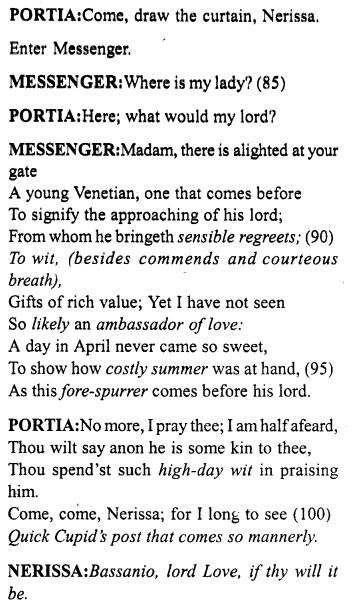
![]()
Modern English Reading
PORTIA : Come, close the curtain, Nerissa.
Enter Messenger.
MESSENGER : Where is my lady?
PORTIA : I’m here; what do you want?
MESSENGER : Madam, at your gate, a young Venetian has just arrived, one that comes ahead of his lord to tell us he is coming; He brings sensible apologies from him; As noted,—besides greetings and courteous sayings,— Gifts of rich value. Yet I haven’t seen such an ambassador of love. A day in April never came so sweetly to show how expensive summer was coming,, as this forerunner comes so urgently before his lord.
PORTIA : No more, please; I am half afraid you will now say he is related to you, You spend such so many words in praising him.Come, come, Nerissa, because I long to see quick Cupid’s messenger that comes so politely.
NERISSA : Bassanio, lord Love, if it is your will!
Exeunts.
Word Meaning With Annotation
Sensible regrets : salutations which are not merely words, but are sincerely felt, to wit, (besides commends and courteous breath) : namely in addition to compliments and courteous words, etc. likely : prepossessing; of good promise, ambassador of love : the messenger who now comes as the representative of Bassanio, to announce that his lord is coming on an errand of love, and to prepare his reception. He is compared to an agent who represents his country, costly summer : summer which is the rich and goregeous season of the year, fore – spurrer : the one who comes squrring (riding) on before, to prepare for the coming of his master, high-day wit : “high-day” is the same as “holiday”, so we might translate this by “holiday humour,” the fine speeches and prepared words that one might use only on a holiday or special occasion. Quick Cupid’s post that comes so mannerly : the swift messenger of Love, who comes in such a courteous manner. Bassanio, lord Love, if thy will it be : “lord Love” still refers to Cupid as the presiding deity, and Portia means, “I hope it is thy will that this is Bassanio, O God of Love.”
For More Resources
